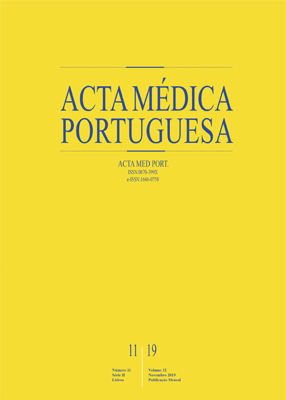Hospitalizations due to Angioedema without Urticaria in a Portuguese Center: Five Year Retrospective Study
DOI:
https://doi.org/10.20344/amp.11893Keywords:
Angioedema, Angioedemas, Hereditary, Angiotensin-Converting Enzyme Inhibitors, HospitalizationAbstract
Introduction: Hospitalizations due to angioedema are important especially in debilitating or life-threatening situations. The aim of this study was to evaluate the frequency and etiology of angioedema without urticaria in hospital admissions.
Material and Methods: The admissions between 2009 and 2013 in Centro Hospitalar Lisboa Norte with a diagnosis grouped under the ICD9 codes of angioedema were retrospectively analysed. The episodes of angioedema with urticaria were excluded. The admissions were categorized into 2 groups: A — hospitalizations motivated by the angioedema; B — hospitalizations in which the angioedema was an incidental finding.
Results: There were 169 hospitalizations (52% females, 96% adults, mean age 52 ± 20.8 years), distributed by 23 hospital departments, 51% in the Immunoallergology department. The mean annual angioedema admission rate was 72/100 000. In 68% of the cases, angioedema was the cause for the admission; in 32% an incidental finding. In 38% there was upper airway involvement. The etiologies were: hereditary angioedema in 24%, angiotensin converting enzyme inhibitor induced angioedema in 31%, idiopathic angioedema in 21%, thrombolysis induced angioedema in 13%, nonsteroidal anti-inflammatory drug-induced angioedema in 5%.
Discussion: The main etiology was angiotensin converting enzyme inhibitor angioedema, followed by hereditary angioedema and thrombolysis induced angioedema, and these findings concur with the international literature.
Conclusion: The mean annual angioedema admission rate was 72/100 000 and there was airway involvement in 38% of hospitalizations.
Downloads
Downloads
Published
How to Cite
Issue
Section
License
All the articles published in the AMP are open access and comply with the requirements of funding agencies or academic institutions. The AMP is governed by the terms of the Creative Commons ‘Attribution – Non-Commercial Use - (CC-BY-NC)’ license, regarding the use by third parties.
It is the author’s responsibility to obtain approval for the reproduction of figures, tables, etc. from other publications.
Upon acceptance of an article for publication, the authors will be asked to complete the ICMJE “Copyright Liability and Copyright Sharing Statement “(http://www.actamedicaportuguesa.com/info/AMP-NormasPublicacao.pdf) and the “Declaration of Potential Conflicts of Interest” (http:// www.icmje.org/conflicts-of-interest). An e-mail will be sent to the corresponding author to acknowledge receipt of the manuscript.
After publication, the authors are authorised to make their articles available in repositories of their institutions of origin, as long as they always mention where they were published and according to the Creative Commons license.









